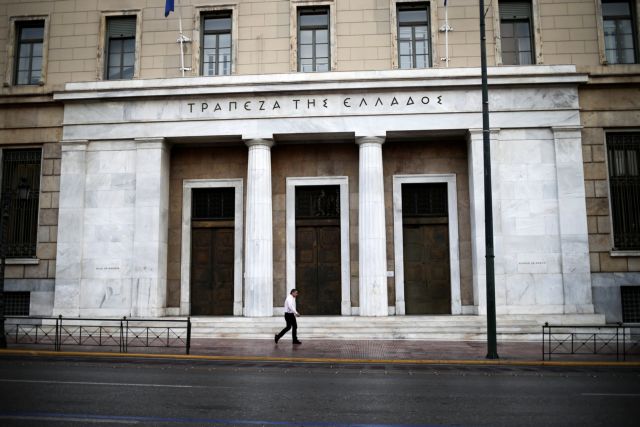The Bank of Greece has published its latest divs on the balance of payments for September 2016. Accoding to the official release, current accounts showed an improvement of €104 million year-on-year and recorded a surplus of €1.0 billion, as a result of an increase of €255 million in the balance of goods and services surplus, which reached €1.1 billion. More specifically, total exports of goods and services grew faster (12.6%) than the corresponding imports (9.1%). By contrast, the primary and secondary income accounts deteriorated.
The deficit of the balance of goods declined year-on-year, owing to an improvement in the oil balance, which offset an increase in the deficit of the non-oil balance. Non-oil exports rose year-on-year, by 12.2% and 15.1% at current and constant prices respectively. This rise was offset by an increase in non-oil imports of goods.
The surplus of the services balance grew by €178 million, as in September all subaccounts improved year-on-year. The largest increase was registered in the transport balance on account of higher net air and sea transport receipts. As regards the travel balance, non-residents’ arrivals increased by 13.7% and the relevant receipts by 2.3%. Net other services receipts improved as well.
In September 2016, the primary and the secondary income accounts deteriorated year-on-year. The decrease in the surplus of the primary income account is mainly attributable to higher net interest, dividend and profit payments, while the increase in the deficit of the secondary income account results mainly from higher general government net payments.
In theJanuary-September 2016period, the current account showed a surplus of €1.4 billion, down by €456 million year-on-year. More specifically, the primary and the secondary income accounts improved, while the balance of goods and services deteriorated.
The balance of goods showed an improvement of €740 million, which reflects the improved oil balance and reduced net payments for purchases of ships. By contrast, the deficit of the balance of goods excluding oil and ships grew, chiefly on account of an increase in the value of imports, while the value of the corresponding exports remained unchanged. It should be noted that, at constant prices, total exports of goods rose by 7.6%, reflecting mainly a rise in the volume of oil exports, while non-oil exports of goods also grew by 3%.
The surplus of the services balance dropped by €1.8 billion year-on-year, mainly due to a significant decline in net transport receipts, which is largely attributable to capital controls. Net travel receipts also recorded a fall. Total non-residents’ arrivals increased by 3.5%, while the corresponding receipts declined by 5.5%. These developments were offset to a small extent by an improvement in the other services balance.
In the January-September 2016 period, the primary income account showed a surplus of €504 million, up by €330 million year-on-year. This improvement is attributable, primarily, to higher net receipts under the other primary income subaccount, which includes taxes and subsidies on products and production and, secondarily, to lower payments for wages and salaries. Finally, the deficit of the secondary income account narrowed by €244 million, on account of lower general government net payments.
Capital account
InSeptember 2016, the capital account showed a small deficit of €25 million, which was lower than that in the same month of 2015, while in theJanuary-September 2016period it showed a surplus of €613 million, up by €60 million year-on-year.
Combined current and capital account
InSeptember 2016, the combined current and capital account (corresponding to the economy’s external financing requirements) showed a surplus of €983 million, up by €140 million year-on-year. In theJanuary-September 2016period, a surplus of €2.1 billion was recorded, down by €396 million year-on-year.
Financial account
InSeptember 2016, under direct investment, residents’ external assets rose by €114 million, with no remarkable transactions. Residents’ external liabilities, which represent non-residents’ direct investment in Greece, increased by €412 million. The most important transaction concerns an inflow of €325 million from the sale by Eurobank of its 80% stake in Eurolife ERB Insurance Group Holdings S.A. to Costa Luxemburg SARL, a company which is jointly controlled by Fairfax Financial Holdings Limited and OMERS Administration Corporation.
Under portfolio investment, a €299 million decrease in residents’ external assets is attributable to a drop in residents’ investment in foreign equities and financial derivatives (of €421 and €190 million respectively), which was partly offset by an increase in residents’ holdings of foreign bonds and Treasury bills. A €424 million decrease in liabilities reflects mainly a decline in non-residents’ holdings of Greek government bonds and Treasury bills.
Under other investment, a decrease of €1.7 billion in residents’ assets mainly reflects the statistical adjustment related to holdings of euro banknotes (down by €1.0 billion) and a decline in residents’ (credit institutions’ and institutional investors’) deposit and repo holdings abroad (by €742 million). A €2.3 billion fall in liabilities reflects a drop of €902 million in non-residents’ deposit and repo holdings in Greece (the TARGET account included) and a decline of €1.1 billion owing to the statistical adjustment related to holdings of euro banknotes. The outstanding debt also decreased as a result of the repayment of a Greek State loan to the International Monetary Fund (€450 million).
In theJanuary-September 2016, period, residents’ assets from direct investment abroad declined by €809 million, while the corresponding liabilities, that represent non-residents’ direct investment in Greece, increased by €1.8 billion, compared with a rise of €688 million in the same period of 2015.
Under portfolio investment, residents’ external assets registered an increase of €5.3 billion, which is mainly attributable to a rise of €7.4 billion in residents’ holdings of foreign bonds and Treasury bills, that was partly offset by a decrease of €2.1 billion in residents’ investment in foreign equities. Residents’ external liabilities fell by €2.5 billion, mainly on account of a decline in non-residents’ holdings of Greek government bonds and Treasury bills.
Under other investment, a decline of €11.2 billion in residents’ external assets largely reflects a decrease of €7.2 billion in resident credit institutions’ and institutional investors’ deposit and repo holdings abroad, and a drop owing to the statistical adjustment related to holdings of euro banknotes (€3.8 billion). On the liabilities side, a drop of €6.7 billion was recorded, which is attributable both to a decrease of €6.3 billion in non-residents’ deposit and repo holdings in Greece (the TARGET account included) and to the effect of the statistical adjustment (down by €4.4 billion). These developments were partly offset by an increase in the outstanding debt of the public and the private sector to non-residents.
At end-September 2016, Greece’s reserve assets stood at €6.8 billion, compared with €5.1 billion at end-September 2015.
Note: Balance of payments statistics for October 2016 will be released on 21 December 2016.
Balance of payments: September 2016 – Table





